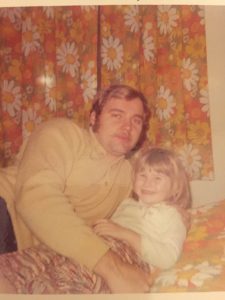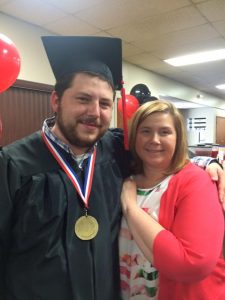
September is officially suicide Prevention Month. Regardless of the month, suicide is always a relevant topic, unfortunately. It’s the 10th leading cause of death in the nation. Suicide wrecks over 44,000 families every year. For every single completed suicide, there are 25 more failed attempts. That is over 1 million attempts every single year! Friends, you undoubtedly are connected right now to someone in the throes of life and death, even unbeknown to you.
Imagine! This life is a precious gift from a Creator whose valuation of us is enormous. And yet thousands of people every year are convinced, through heartache and hopelessness, to relinquish their future. Today, Steve and I want to use our platform on Life Of The Family to illuminate this area for as many families as we can. We spent some time this week speaking with Rachel, a friend of ours, who faced this battle as a young adult and is ready to share her story.
LOTF: Rachel, what were the circumstances surrounding your family when suicidal thoughts first began?
R: The turning point in my life was between ages 11 and 13. My parents were getting divorced and in that process, I found my birth certificate – only to discover my dad was not actually my birth father. I was shattered! I suddenly felt like I had no idea who I was.
LOTF: Did your struggle ramp up slowly, or was it like a tidal wave?
R: From the age of 13 to 17 I tried desperately to figure out who I actually was and where I fit now. Try as I might, I never quite seemed to discover it. So I became reckless and careless, searching to feel loved and valued anyplace that I could imagine. Unfortunately, this only left me feeling more alone than ever.
LOTF: Suicidal thoughts and depression are real but invisible life-threatening wounds. What kinds of things appeased or aggravated your pain during this period?
R: At the time, I felt betrayed and abandoned by my family. My desperate need for love and my naivety led me to believe that sex equaled love. As a result, I ended up with a reputation. My personal value felt even more diluted in the end. This lasted about 4 years. During my senior year of high school, I hit a wall. I was fully convinced that my life was no longer worth living.
LOTF: The struggle with suicidal thoughts can be incredibly isolating. Whom, if anyone, did you approach for help and what was their response?
R: For me, it was a classmate who had just returned to school after being “in treatment.” I understood from my own personal experience that gossip is not always true. I was brave enough to ask him directly about his experience. This acquaintance willingly spent time sharing his story with me that day.
LOTF: Was being honest worth the emotional risk for you?
R: Although our circumstances were different, my classmate seemed to actually comprehend what I was dealing with. He shared how helpful it was for him to be undergo the inpatient treatment. In that moment, I clearly remember feeling like this option was my last hope. If it had not been for this friend’s vulnerability, I may not be here today!
LOTF: How aware was your family of the situation you were in? How did it effect each of them?
R: I can’t fully remember the details of my conversation with my parents. But I did explain how frequently that I felt like ending my life. I told them I felt that inpatient treatment was my last chance. Thankfully, they both agreed and I was admitted soon after. My mom understood, having had her own variety of intense troubles. Conversely, I believe that my dad was conflicted. As a father, he very much wanted to be able to fix me and was powerless.
LOTF: What was it like to recover; what helped you actually arrive on the other side of the battlefield?
R: I’m not sure recovered is the word. At age 17, I was hospitalized for 3 months. I felt so renewed, I imagined that I was fixed. I thought my life would resume and be normal. The reality was different. Now, I had a new, undesirable label: “broken.”
LOTF: How was that label being projected on you?
R: Well, the most difficult instance was when someone from my senior class (actually, my prior homecoming date) walked up to me and said, “You don’t deserve to walk with us for graduation.” He had no clue that I went to school everyday even while I was in the “coo-coo nest.”
LOTF: How did you respond to that episode of shaming?
R: I decided I would prove him and everyone else wrong. However, I still didn’t grasp the long road that lay ahead of me. My story was not one and done.
LOTF: Families need to understand that while this may be a long process to partner in, it’s not a hopeless one. Can you explain what lay ahead for you, Rachel?
R: Two years later, I decided that overdosing on speed was the way to go. I don’t remember the one thing that broke me or led me to decide that finally ending my life was the answer, but I do remember the agony of waiting for it to happen. As I lay there, my heart began to beat at an ever increasing rate. Remarkably, I found myself beginning to focus on what I had to live for – rather than what wasn’t worth living for! In that moment, I cried out for help. Luckily, my roommate was home. She drove me straight to the same hospital and I was admitted for 72 hours. I continued to live a reckless and lost life for another 2 years until I find myself pregnant with my son Alex. If anything saved my life, it was my son. I had no choice at that point; I needed to step up, grow up and be the mom he deserved.
LOTF: I imagine your parenting style was affected by your experience with suicide and family dysfunction. How did you parent Alex and your daughter Hannah differently?
 R: My kids are beyond what I could even imagine! They have grown up to be strong and able to love wholeheartedly. I know they have each had their challenges, but I found way to make it abundantly clear that I am always there for them. They believe they can come to me when they are struggling. As for my parenting style, I have not been perfect; I have failed many times. Nonetheless, my love for them has been steadily communicated, regardless of their choices and trials. The sum of my experiences made me much more aware than my own parents were. I believe they loved me. It’s just that I didn’t feel I had a voice in my home, and I fought to make sure my 2 kids had that.
R: My kids are beyond what I could even imagine! They have grown up to be strong and able to love wholeheartedly. I know they have each had their challenges, but I found way to make it abundantly clear that I am always there for them. They believe they can come to me when they are struggling. As for my parenting style, I have not been perfect; I have failed many times. Nonetheless, my love for them has been steadily communicated, regardless of their choices and trials. The sum of my experiences made me much more aware than my own parents were. I believe they loved me. It’s just that I didn’t feel I had a voice in my home, and I fought to make sure my 2 kids had that.
LOTF: If you could go back and tweak something, what area would you pick?
R: If I could rewind the clock, I would have been more open with my parents about how I was feeling, from the very beginning. I imagined I was the only flawed person in this perfect family. I believe that families do more harm by portraying this picture of a “perfect family.” In reality, every person in the family is deeply hurting at times. In my late 20s, I finally grasped that family is more than blood. Nevermind my birth certificate; family is first and foremost the people who love and support me unconditionally.
My final turning point was a couple years after my daughter was born and my mom and step-dad had offered to take the kids for the weekend so I could attend a Cursillo Retreat. Although I had believed in Christ, it was there I had an encounter that would forever change my life.
LOTF: What are families missing most, in your opinion, to keep each other safe and sound?

R: Be aware and be brave enough to ask those in your family, dig in and investigate. Stop worrying about what outsiders may think. Tune them out and focus immediately on what is best for your family. TALK about it. I know its not a topic anyone is comfortable addressing, including my own family – but it is real. We cannot afford to be blind to the battles those around us are enduring silently. We must be brave enough to take a risk with those we love, step up, and reach out. Above all else we must accept that this crisis our loved ones are undergoing is real. Love your family in the same intense manner that Jesus loves you– apply the complete willingness to lay down your life. Believe me, it will save a life.
For readers who are curious, check out Cursillo at: tc-cursillo.org
If you or someone you care about is struggling with depression or suicidal thoughts, there are more resources at: afsp.org/find-support
Immediate warning signs that someone may be in a suicidal crisis include:
- Feelings of hopelessness or desperation
- Insomnia
- Panic attacks
- Social isolation
- Irritability, Rage
- Feelings of being a burden









Perfect description! Vulnerable and brave! Love you! Uncle Wayne and Aunt Christi
Working on this project really impacted me! Her story is powerful.
As Rachel’s Mom I am so proud of her willingness to “come out” about her struggles. I remember very clearly the trips to visit with her at the hospital those 3 months. All Glory goes to our God who is faithful to us no matter what we are have gone through, are going through and what we will go through in the future. My thanks to all those who have loved her and helped her along the way to who she is today….a strong woman who loves God, her family and her friends. I have no doubt that God will use her to bring hope of a fulfilled life to many.